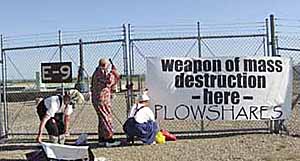Canadian Mennonite
Volume 10, No. 20
October 16, 2006

Letters
This section is a forum for discussion and discernment. Letters express the opinion of the writer only, not necessarily the position of Canadian Mennonite, the five area churches or Mennonite Church Canada. Letters should address issues rather than criticizing individuals and include contact information. We will send copies of letters referring to other parties to them to provide an opportunity to respond in a future issue if their views have not already been printed in an earlier letter.
Please send letters to be considered for publication to letters@canadianmennonite.org or to Canadian Mennonite, 490 Dutton Drive, Unit C5, Waterloo, ON, N2L 6H7, “Attn: Letter to the Editor.” Letters may be edited for length, style and adherence to editorial guidelines.
North Dakota’s peace clowns await sentencing
 |
I did some checking on the Internet recently and discovered that North Dakota, Manitoba’s next-door neighbour to the south, is home to more nuclear weapons than any other of the 50 states in the U.S. The Bureau of Atomic Scientists has estimated that the state provides a home for more than 1,700 nuclear warheads, not counting the ones planted in concrete silos in the ground ready to blast off.
The writer on one website said that a friendly cab driver in Bismarck had told him, “If North Dakota seceded from the union, we would be the world’s third most-powerful nuclear state.”
“The Peace Garden State alone,” says Adam Stone in one of his website articles, “has the capacity to send any country of any size…back to the Stone Age….
“In an age where conflicts are increasingly fought among supranational groups, rather than nation-states (both the U.S. and Israel are fighting wars against organizations, not nations), is having an overwhelming nuclear arsenal the wisest decision for America?” asks Stone. “If Al-Qaeda set off a dirty bomb in downtown Seattle, where would we send our nuclear weapons? Southeastern Afghanistan? Beirut? Tehran?”
That so many of North Dakota’s warheads are so close to the International Peace Gardens south of Boissevain is ironic. One blogger has proposed that North Dakota consider changing its name to “Nuke Dakota.”
How should people of faith respond to this overwhelming mass of destructive material right under our noses?
The reason for my preparing this article is to tell you about three Christians—a priest and two veterans—from Duluth, Minn., who felt they needed to say and do something about this situation. They followed through on their commitment, and went on trial in Bismarck last month for their witness against the weapons of mass destruction.
On June 20, these three Plowshares Movement peace and disarmament activists from a Catholic parish in Duluth—Greg Boertje-Obed, Michael Walli and Father Carl Kabot—began the disarmament and conversion process of one of the deadliest weapons of mass destruction through their Plowshares witness.
Using household hammers, they pounded on the concrete lid covering the E-9 missile silo on the Mandan-Hidatsa-Arikara First Nation, which houses a Minuteman III nuclear missile. They poured their blood to make visible the bloodshed resulting from the manufacturing, testing and use of nuclear weapons, and they spray-painted “It is a sin to build a nuclear weapon” on the lid of the silo.
Dressed as clowns, the three offered the gift of healing through their willingness to be “fools for God and humanity.” With humour and laughter, they hoped to transform the structures of destruction and death. The three were arrested at the site and in September were found guilty of “destruction of government property in excess of $1,000,” and are now facing up to 10 years in prison and fines of up to $250,000. They are to be sentenced on Dec. 4 in Bismarck.
Boertje-Obed’s wife, Michele Naar-Obed, has kept many of us posted on a regular basis concerning what is happening to the three prisoners.
One of the messages she sent to her network of supporters was a reflective piece her husband had written in custody while awaiting trial: “Our inner voices ask: What would be the effect if farmers [here in North Dakota] allowed signs to be placed near missile sites announcing, ‘War crimes here,’ ‘Nuclear terrorism here’? Such actions could be like the mustard seed parable, growing to where groups of people would come together and say, ‘The engines of crimes against humanity are not welcome in our midst.’ ‘What sort of example are we giving our children by allowing these nuclear horrors?’
“We are reminded,” he continued, “of Plowshares Movement founder Phil Berrigan’s comment, ‘Don’t get weary in the struggle to resist nuclear evils and to promote justice and love.’ Each one of us can take more steps to further peacemaking.”
We Manitobans have a “nuclear wasps’ nest” under our very noses. What should we be saying and doing at such a time as this? To begin, let’s be in prayer for Boertje-Obed, Walli and Kabot as they await sentencing. And let us also be in prayer about what sort of witness we should be giving as people of faith at this crucial time in the world’s history.
Mutually exclusive Bible understandings divide church
It is difficult for me to know if or how I should respond to Peter Braul’s letter, “CIM discipline was fair and scriptural,” Sept. 4, page 15.
Living in Toronto, I did not participate in the debates and the struggle in Alberta about Calgary Inter-Mennnonite Church. I suggest, however, the issue is not whether Mennonite Church Alberta followed its rules and constitution properly. I think Braul points inadvertently to the main issue in his first paragraph.
He writes, “They [Calgary Inter-Mennonite] had no intention of following the teaching of Scripture.” In fact, Calgary Inter-Mennonite and other congregations are following their understanding of the teaching of Scripture just as Mennonite Church Alberta is following its understanding. What is very painful is that these two understandings have been deemed mutually exclusive by Mennonite Church Alberta.
Right now, a congregation cannot be both part of the Supportive Congregations Network and a member of Mennonite Church Alberta. Braul obviously believes this separation is right and just. He also says it is faithful to Scripture.
I agree that it is right and just according to the rules developed by congregations that are part of Mennonite Church Alberta. I do not agree these rules are faithful to Scripture. The choice is not whom we serve, as Braul says at the end of his letter. CIM members and I serve God and our Lord Jesus Christ too.
The choice is which process to use to resolve a significant difference in the interpretation of Scripture. I do not believe separation and exclusion are proper methods to resolve differences. Braul, and perhaps Mennonite Church Alberta, seem to feel otherwise.
CIM provides gays a place of acceptance
Peter Braul’s letter, “CIM discipline was fair and scriptural,” Sept. 4, page 15, makes it clear why Calgary Inter-Mennonite Church must exist. Braul’s “we’re saved, you’re damned” view portrays a church with no place for gay and lesbian persons or their parents. CIM offers us a safe place to worship and to be completely accepted. I thank God for CIM.
Faith confession leads to faith in the future
I must write to say thanks to Sarah Johnson for sharing her personal confession of faith, and to Canadian Mennonite for publishing it in your Aug. 21 edition (page 8). It has led to much discussion and dialogue. I am struck by the contrast between this piece and that of the interview with Josh McDowell on the same page. I have more faith in future generations than he seems to have.
Photograph of ‘racing’ combines appreciated
I just thought I would tell you how much I enjoyed your Sept. 4 cover picture of all the combines racing! Awesome picture and how nice to put it on the front.
New Order voice
Love subverts the lingo
 The man who handed out “666” pamphlets in the park yesterday warned me of a looming Armageddon and talked about “accepting Jesus into my heart.” He looked both confident and desperate. The glossy Christian extremist brochure he gave me foretold of a mighty cosmic battle and advised us would-be survivors to avoid the dreaded mark of the beast.
The man who handed out “666” pamphlets in the park yesterday warned me of a looming Armageddon and talked about “accepting Jesus into my heart.” He looked both confident and desperate. The glossy Christian extremist brochure he gave me foretold of a mighty cosmic battle and advised us would-be survivors to avoid the dreaded mark of the beast.
His name was Simon and to my ears he was talking gibberish.
I can no longer relate to goopy apocalyptics with their metaphysical forecasts of doom. It’s science fiction to me, a metaphor at best. My worldview is less spiritual and more material. Who needs to add four flaming horsemen to our current material realities such as unequal distribution of food, clothing, healthcare and shelter, the presence of surveillance cameras, prison, torture, stun guns, minimum wage and free trade agreements?
This world here and now has enough concerns. To fret about the afterlife, to invoke the doom of future beasts and dragons, is escapism, repression, distraction or delusion. The language of cosmic, psychedelic doom seems irrelevant, nonsensical.
What’s my response? I have my own gibberish. I like to talk about contested space and counter-hegemonic discourses. I like to delegitimize the discourse of war, undermine dominant ideology with subversive readings of texts, jam the culture with semiotic twists and make “normal” problematic for the middle-class.
My Anabaptist identity is folded into this mumbo jumbo. It stems from a consensus-driven, countercultural, non-hierarchical, post-patriarchal community—or priesthood of all believers. It is embodiment politics, radical democracy, a quest for meaning beyond commodities—or simply living more with less. It’s moving to the periphery, pursuing humility and acknowledging the facade of powerlessness among us do-gooders in the dominant subgroups of society—or cruciform Gelassenheit (yieldedness to God’s will). Words, freaking words.
Simon told me he “took Jesus into his heart” in 1975, after experimenting with the Hare Krishna movement and others. So I asked him, “How do you know which truth to pick?” I wanted to crack his certitude with an epistemological knock.
He obviously didn’t understand my loopy worldview, because he answered, “When I accepted Jesus into my heart [he began to smile at this point] I knew that…,” and he repeated some cosmic mishmash I can neither recall nor comprehend. Freaking words.
In the park, on a warm day in fall, this man talking religious gibberish cared enough about me to hand me a pamphlet. His day job is driving a small bus for physically handicapped people. He doesn’t attend a church and distributes literature produced in California. He had two cell phones, one in either coat pocket, each with a different ring. He lives in my neighbourhood.
He said he was alone. And I was trying to trip him up with my intellectual tricks. Lord have mercy on us both and may we meet again.
Outside the box
The age of paranoia
 In a sign of the times, a recent poll in the United States found more than a third of Americans believe their own government masterminded the 9/11 attacks.
In a sign of the times, a recent poll in the United States found more than a third of Americans believe their own government masterminded the 9/11 attacks.
Conspiracy theories are nothing new. My wife can muster up frustratingly plenty of them when the Stanley Cup finals go to seven games in the middle of June.
But 9/11 has ushered in a new age of paranoia when citizens of a nation believe their government is out to get them. Something tells me we’ve seen this dog and pony show before. Yes, this is the madness of a crumbling empire we are beholding.
Let us beware the Canadian snobbery, though, for this is an empire without borders or political affiliation. So, here’s the real question that demands careful thought: Has the age of paranoia infected the church?
Interestingly, “paranoia” is a Greek word we’ve cut and pasted into the English vocabulary. It’s not found in the New Testament, but its beautiful cousin, “metanoia,” is. Indulge me in a brief Greek lesson: “para” means “outside” and “nous” means “mind,” so paranoia literally means to be “out of your mind.” It means you’ve stopped exercising your grey matter, you’ve let the hamster off the wheel, you’ve ceased running the elevator to the top floor, you’ve stopped doing what makes most sense.
What then of “metanoia”? “Meta” to the Greeks meant “after.” Couple that with “nous” and you have “after mind.” In other words, “metanoia” is what happens after the light has been turned back on in the penthouse, after the hamster has been freed to resume his exercise program. It is, in short, to change one’s mind and head in the opposite direction in light of truth received. In the English New Testament, “metanoia” is the word “repent.”
Are our congregations marked by paranoia or metanoia these days? Are we asylums of madness or communities of repentance?
Repentance ought not be reduced to a one-time—and purely individual—change of mind and heart. Repentance is as communal as it is individual, and as necessary today as it was yesterday. The aroma of repentance ought to be in the air wherever Christians go in this paranoid age.
What would it mean to be communities of ongoing repentance? What would it mean for us to be constant in renewing our minds in view of God’s mercy, in order that we may move forward as missionaries of an eternal kingdom in the midst of a floundering realm? Can we repent of old structures? Can we repent of new blueprints? Can we repent of uncaring bullheadedness? Can we repent of denominational, institutional, intellectual or anti-intellectual pride? Can we repent of not repenting?
Or, shall we be asylums of the paranoid—where parking lot proxies produce crackpot theories, where we drive on brazenly or dig in our heels, where we press on in our self-proclaimed brilliance without considering whether our social, political or theological convictions reflect the kingdom of God or are simply the parroting of the paranoid?
Have we forgotten our true citizenship? Have we forgotten that at best we see through stained glass? Have we become the target of Jesus’ words to the church at Ephesus in Revelation 2: “I know your deeds, your hard work and your perseverance.… Yet I hold this against you: You have forsaken your first love.… Repent and do the things you did at first.”